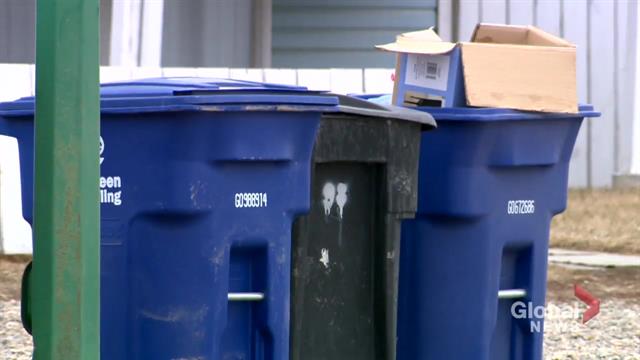Jay Stanford, London’s director of environment, fleet and solid waste, says statistics suggest Londoners have been heeding the city’s call to limit the amount of waste being left at the curb.

The stats come just as the city’s three container limit exemption comes to a close.
On April 13, the city reported that its three container limit exemption would go ahead as usual despite the novel coronavirus pandemic, but that it would be asking residents to be mindful of how much waste they leave at the curb. Considering the exemption, coupled with the fact that many Londoners would be home much more than normal, it would be easy to expect a large increase in household waste.
The one per cent increase is well below the five per cent increase reported by the Ontario Waste Management Association, Stanford said. The OWMA surveyed 12 municipalities in Ontario, including London, but did not provide details as to the specific increases reported by individual municipalities.
While he cannot say for sure, Stanford noted that despite the fact that the exemption went ahead as normal, the city also ran an awareness campaign in April asking Londoners to be mindful of what they’re putting at the curb.
“Be respectful of our collectors, our recycling operators, and do your part to not even put out bulky items — if you can hold on to a mattress, or couch, a little bit longer, please do that. So, perhaps that’s also the reason why waste quantities didn’t go up dramatically here in London.”
Recycling, meanwhile, is up about four per cent in London, according to Stanford.
“We’re really pleased because the sanitation operators, the recycling collectors, the folks working at the EnviroDepot — they’re front-line workers too, just doing a wonderful job keeping services going, following all the rules. We’ve managed to do a really good job, attendance has been really strong. That doesn’t mean there’s not anxiety with the crews — just like all Londoners, people are concerned — but we’ve also asked Londoners to be very respectful,” he said.
“It’s great to see that we’ve had really good cooperation here in London.”
There was also increased activity at depots, according to Stanford. The city charges $1.50 for each bag dropped off, but that fee was waived until May 4 as part of the city’s COVID-19 service changes.
Depot operator Try Recycling is reporting about a seven per cent increase, Stanford said. “Normally, over the month of April, we get about just shy of 36,000 visitors. This year it was well over 38,000.”
Stanford said with those increased visits to the depots, it was anticipated that composter sales would climb, but that didn’t happen.
“They actually went down 30 per cent. At the same time, I think people are coming to the depot, doing their drop-off, and then getting out of there because we’re asking them to keep physical distance and not stay long,” he said.
“I think, once again, Londoners are just being respectful of the situation here. And composter sales — you know what? Let them take off later in June, July, and August, too.”
At this point, Stanford says garbage and recycling services are operating smoothly with minimal impact due to the novel coronavirus.
- Canadian man dies during Texas Ironman event. His widow wants answers as to why
- ‘Super lice’ are becoming more resistant to chemical shampoos. What to use instead
- Canadians more likely to eat food past best-before date. What are the risks?
- Treatment from female doctors leads to lower death rates, study finds
“Our Household Special Waste Depot remains closed and that will likely be the case for a good portion of May,” Stanford said. Officials will start looking at what facilities can open, and will discuss that with city council, he said. “But for the most part services here in London have been running smoothly.”
Stanford added that the usual rush of students leaving at the end of April was staggered throughout the month as classes moved online due to the pandemic.
He also used the opportunity to stress to everyone that “biodegradable” wipes should never be flushed down the toilet. “Look folks, they’re not. Do not put those down your toilet. Put those items into a bag … and then into a garbage bag.”
“We really don’t want to see loose garbage, even in your garbage can. Be respectful to our collectors. Just bag up the materials then put them into the garbage can.”









Comments